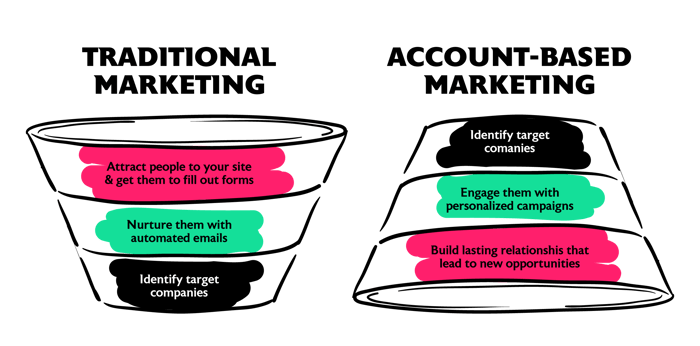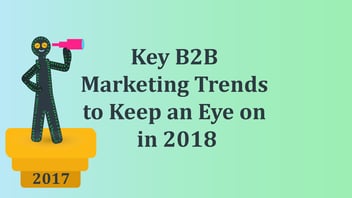
ABM vs Conventional LeadGen: All B2B Marketers Need To Know
Reading Time: 8 great minutes
Account-based marketing (ABM) or conventional lead generation, which way should you go? Well, actually that is the wrong question to ask. In fact, the two strategies complement each other rather well.
With all the confusion surrounding Account Based Marketing and its somewhat complicated relationship with the more conventional marketing approach, we thought this explainer article was way overdue.
What is ABM?
We get it, yet another strategy to invest in, and mastering it is keeping you away from getting all you really want – which is actual qualified leads. That’s why, before we dive deep into account based marketing funnel and best practices, we want to clarify one thing real quick: what is ABM in marketing?
ABM doesn’t have to stand in opposition to what you’ve been doing so far. Try to think about ABM as something that can complement your broader marketing strategy by offering a more tailored approach. How? Let’s see.
Account Based Marketing vs. Conventional LeadGen
Conventional B2B LeadGen tend to take a broader approach to lead generation, with the goal of capturing as many leads as possible within the defined target audience segment. Conversely, Account Based Marketing flips the funnel around (see below)
“Traditional demand generation is like fishing with a net for leads. You don’t care which specific ‘fish’ you catch, you only care if you catch enough. But Account Based Marketing is more like fishing for named accounts with a spear. You reach out to the right people at the right accounts with targeted, relevant messages.” - Jon Miller

Account Based Marketing is a form of strategic B2B marketing based on measurable goals for specific target accounts. Engagio, an ABM and sales software company, simply defines it as: “...a strategic approach that coordinates personalized marketing and sales efforts to open doors and deepen engagement at specific accounts.”
“Specific accounts” is the key here. While inbound marketing casts a wide net to target as many prospects as possible, account-based marketing identifies an entire company as a valuable prospect, before pushing ultra-personalised communications on its employees. These communications can be based on inbound strategy and content marketing as well as outbound paid campaigns.
Account Based Marketing funnel
Unlike the conventional LeadGen funnel that starts as wide as it can and gradually narrows down the leads, B2B ABM funnel focuses on personalizing the journey from the very start. Here’s what it would typically look like:
- Identify target companies – select a group of high-value accounts based on your own strategic criteria. Collaborating with sales early in this process will help you with the identification;
- Engage them with personalized campaigns – in this next step, B2B ABM focuses on deep understanding of your new prospects in order to create content as tailored and personalized as possible to make sure it meets their needs;
- Build lasting relationships that lead to new opportunities – as prospects are nurtured to move down the funnel, the engagement becomes even more personalized, leading to more meaningful conversations and higher conversion rates.
The B2B ABM funnel is ultimately about switching focus from quantity to quality of interactions and relationships you can build with key accounts throughout their entire customer journey.
Reasons to Adopt Account-Based Marketing
While Account Based Marketing is not exactly a new concept in the B2B marketing community, it can be extremely effective at helping marketers create and sustain growth and profitability. Account Based Marketing strategies are ideally suited for B2B firms with long, complex sales cycles that often involve many stakeholders, and are typically high-value. Creating an ABM strategy for a product sold for $25 a month and is suited to a wide audience may not be the right approach. Is your product niche, expensive, and aimed at enterprises? Go with Account Based Marketing.
“Over the last year, we have seen B2B marketers move in droves to account-based approaches.” - Craig Rosenberg
Planned and executed correctly, B2B ABM can help companies to engage earlier in the sales process with high-value opportunities and get the best value and ROI out of their marketing campaigns. If your company hasn’t begun implementing an ABM B2B strategy yet, here are other compelling reasons why you should give at least some bits of B2B ABM a try:
- Personal and highly-optimized content offers - In 2023, around three-quarters of surveyed global customers expressed their expectation for improved personalization when sharing more personal data with businesses. The average prospect is bombarded by thousands of marketing messages each day, and personalization has become a key way for marketers to break through the noise and boost conversions. Because Account Based Marketing is implemented with the needs of a specific target prospect at a specific target account in mind, it involves a high degree of fine-tuning so that your content resonates with key decision-makers at a specific account, making them more likely to engage.
- Clearly defined ROI - Effective Account Based Marketing drive clear business results. According to Momentum ITSMA’s annual ABM Benchmarking study, 72% say ABM delivers higher ROI than other types of marketing. It’s incredibly precise, highly targeted, personalized, and accurate compared to general inbound/outbound strategies - making it much easier for marketers to measure ROI.
- Efficient Use of Resources - By scaling account based marketing strategies, B2B marketers can do more with less. Because ABM is so targeted, it allows marketers to focus their resources effectively, and run marketing programs that are specifically optimized for target accounts.
- Align Sales and Marketing - ABM is also one of the most efficient ways to align sales and marketing, helping to unite teams instead of divide them. Marketers have to work closely together with salespeople in order to accurately identify target accounts, map them out, and align on sales initiatives.
- Enhanced goal-setting and analytics - It’s easier to analyze the effectiveness of ABM campaigns, as you’re looking at a smaller set of target accounts (instead of a vast set of metrics). Not just that, but you also have well-drawn battle plans/strategies for each account, which allows you to effectively compare end-of-quarter results to forecast goals.
ABM vs. other marketing approaches
Now, we know how B2B ABM differs from a more conventional LeadGen strategy, but how does it stand opposed to other strategies, mainly inbound marketing and demand generation? Understanding these differences will help you refine your B2B marketing strategy and maximize its impact. So let’s see:
ABM vs. LeadGen
Just to sum up everything we’ve just said, wherever lead generation focuses on casting a wide net to capture a large volume of potential leads, ABM is all about quality of those leads from the very beginning by tailoring marketing efforts to engage and nurture key decision-makers within identified accounts.
ABM vs. inbound marketing
While ABM is a targeted approach where marketing efforts are customized for specific high-value accounts, inbound marketing relies on techniques like SEO, blogging, and social media to draw potential leads into the sales funnel organically. Inbound marketing is more of a passive and reactive approach, while ABM is very much focusing on staying proactive and engaged.
ABM vs. demand generation
Even though the two might share similar tactics, including content marketing, advertising, and events, demand generation focuses on building awareness and interest across a wide audience in order to, as its name suggests, generate demand for a specific product or service on the market. ABM will rather be focusing on finding and attracting the right set of high-value accounts to foster their needs, again valuing quality of the engagement over quantity.
"Don't count the people that you reach, reach the people who count". - David Ogvily
Account-Based Marketing: The Future of B2B Marketing?
For B2B marketers, account based marketing services offer both limitless possibilities and proven results. Thanks to improvements in technology, it’s now possible to coordinate and execute ABM campaigns with much greater scale and efficiency than ever before.
However, as with any marketing campaign, ABM requires a solid understanding of the approach and its execution and optimization. Done effectively, it can be a valuable marketing strategy, easily increasing the number of qualified leads.






